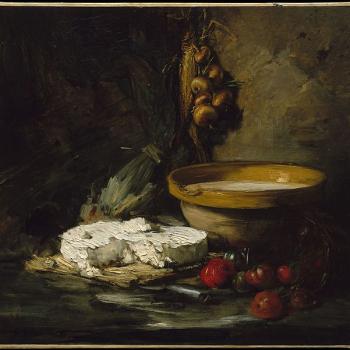The next day the women were led into the amphitheatre. At the demand of the mob they were first scourged; then a wild cow was set upon them. First the cow threw Perpetua to the ground, but then sitting up she pulled down the tunic that was ripped along the side so that it covered her thighs, "thinking more of her modesty than of her pain." Next she asked for a pin to fasten her untidy hair: "for it was not right that a martyr should die with her hair in disorder, lest she might seem to be mourning in her hour of triumph." Then she got up and seeing that Felicitas had been crushed to the ground, she went over to her, gave her hand, and lifted her up. Then the two stood side by side. They kissed one another with the ritual kiss of peace, after which two gladiators came and cut their throats.
Historian Michael Green writes that the "joy of [the early] Christians both in life and death is closely linked with their patient enduring of scourging, insults and martyrdom which had an incalculable effect in bringing observers to faith." "If women like these were at all typical throughout the varied social strata of the church, it is hardly surprising that the gospel overcame enormous obstacles in its way, and began to capture the Roman empire." The 2nd-century theologian Tertullian wrote, "The more we are mowed down by you, the more in number we grow. The blood of Christians is seed."
Nevertheless, martyrs disturb us. Deep down we wonder about people who take their faith so seriously. But martyr is just the Greek word for witness. Martyrs weren't people who went around looking to die. They were simply people who had found the way and decided to follow no matter what. The rest was out of their hands.
I don't know about you, but I read of these Christians and am forced to remember the regular ease with which I compromise with my culture; how readily I neutralize my convictions; how often I wilt at the slightest challenge; how much I want for my world to like me. My faith gets wound up with meeting my needs rather than getting my needs judged by the gospel.
I want Jesus to work for me instead of on me; yet he continually disturbs and assaults my soul so as to shape it back into his image. I think of the radical implications of being a genuine Christian and do wonder why anyone with a brain would follow Jesus. But then I think of his words of life and wonder how anyone would not.
St. Paul wrote, "I want to know Christ and the power of his resurrection and share in his sufferings by becoming like him in his death, that I may attain the resurrection from the dead." I want that too. So I pray for some small measure of courage that I might submit to the gospel and not be ashamed of it; some small measure of courage that I might take up my cross and follow.





